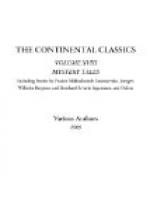Joco, the bear-leader, was giving a performance. His voice rang like a bugle-horn, and, singing his melancholy songs, he from time to time interrupted himself and hurrahed, whereupon the bear began to spring and roar angrily. The two stamped their feet, holding close together, like two tipsy comrades. But the iron-weighted stick in the young man’s hand made it evident that the gigantic beast was quite capable of causing trouble, and was only restrained from doing so because it had learnt from experience that the least outbreak never failed to bring down vengeance upon its back. The bear was a very powerful specimen from Bosnia, with thick brown fur and a head as broad as a bull’s. When he lifted himself up on his hind legs he was half a head taller than Joco, his master.
The villagers stood round them with anxious delight, and animated the bear with shouts of “Jump, Ibrahim! Hop, Ibrahim!” but nobody ventured to go near. Joco was no stranger to these people. After every harvest he visited the rich villages of Banat with his bear. They knew that he was a native of the frontier of Slavonia, and they were not particularly keen to know anything else about him. A man who leads such a vagrant life does not stay long in any one place, and has neither friends nor foes anywhere. They supposed that he spent part of the year in Bosnia, perhaps the winter, visiting, one after the other, the Servian monasteries. Now, in midsummer, when he was least to be expected, they suddenly hear his fife and drum.
Ibrahim, the big old bear, roused the whole village in less than a quarter of an hour with his far-reaching growls. The dogs crouched horror-struck, their hair standing on end, barking at him in fear and trembling.
When Joco stopped at some street corner, or in the market-place, and began to beat his rattling drum, the bear lifted himself with heavy groans on his hind legs, and then the great play began, the cruel amusement, the uncanny, fearful embracings which one could never be sure would not end fatally. For Joco is not satisfied to let Ibrahim jump and dance, but, whistling and singing, grasps the wild beast’s skin, and squeezes his paws; and so the two dance together, the one roaring and groaning, the other singing with monotonous voice a melancholy song.
The company of soldiers stationed in the village was just returning from drill, and Captain Winter, Ritter von Wallishausen, turned in curiosity his horse’s head towards the crowd, and made a sign to Lieutenant Vig to lead the men on. His fiery half-blood Graditz horse snuffed the disgusting odor of the wild beast, and would go no nearer.
The Captain called a hussar from the last line that passed him, and confided the stubborn horse to his charge. Then he bent his steps towards the swaying crowd. The villagers opened out a way for him, and soon the Captain stood close behind the bear-leader. But before he could fix his eyes on Ibrahim they were taken captive by something else.




